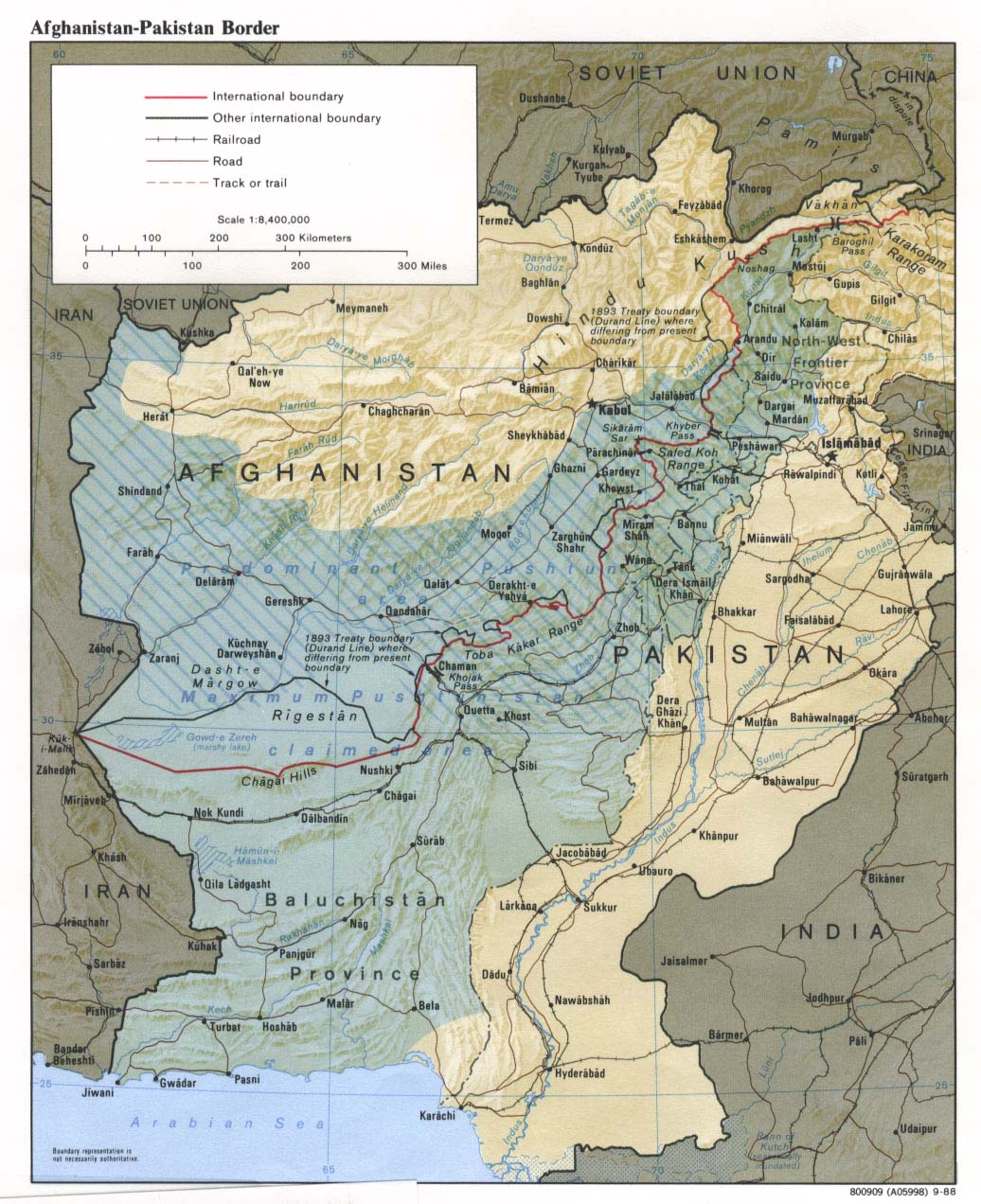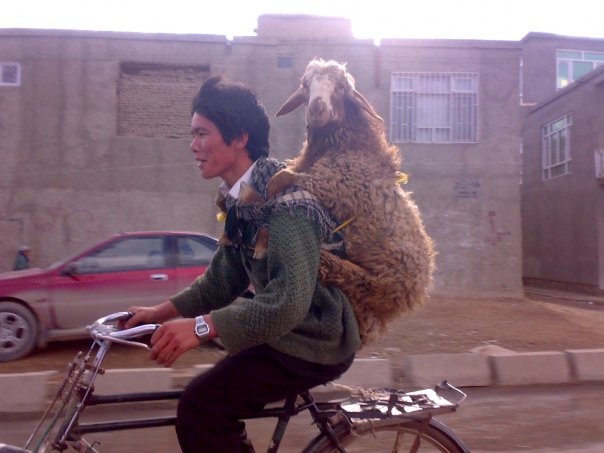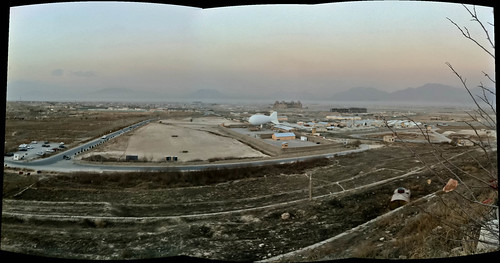Happy New Year!
Thanks to Anselm for coming up with it, we have a new tagline:
Get it? We’re focused on bringing technology to the Khyber Pass. Just a few days ago, we took a drive to it’s Western Edge, the Torkham Gate.
This street scene brought to you by JD, a friend of the TAJ:
Nan Factory
While walking down the streets of Kabul last week I stared a little too inquisitively into a nan store/factory pumping out the long, flat bread that is eaten with every meal in Afghanistan. The man stretching the dough noticed my prying and invited us in to see the whole process up close, encouraging us to take photographs and film the intricate, six man team working together to form the vat of dough into identical diamonds of flat bread. The bread is baked in a clay tandoori oven, stuck vertically up against the inside wall. As the finished bread is pulled off the oven walls with long iron hooks, a man in the window sells the hot, steaming finished product to customers, who frequently go away with half a dozen or more loaves. In a traditional Afghan meal instead of a plate each person is given a full loaf of bread. He or she tears off chunks and uses them in place of utensils to scoop up chunks of lamb or beans. They sent us away with a steaming, flat, piece of nan. Delicious.
Links
This has floated across my linkspace over the past week:
Israel is planning to fund this rare genetic study to determine whether there is a link between the lost tribes of Israel and the Pashtuns. (Wikipedia) “Of all the groups, there is more convincing evidence about the Pashtuns than anybody else, but the Pashtuns are the ones who would reject Israel most ferociously. That is the sweet irony.”
—Shalva Weil, anthropologist and senior researcher at the Hebrew University of Jerusalem
Glossary
Terms picked up along the way:
The Eye in the Sky is the large white object in this photo:
It’s dusty here, and late. I’m going to use a Neti Pot to clear out my sinuses and try to catch some sleep.
Afghan National Dresses
I found this scanned calendar of Ariana Afghan Airlines from 1973 and am reposting here.
[flickr-gallery mode=“photoset” photoset=“72157625559950781”]
Clicking on an image will bring up a lightbox. Then you have to click on the sides of the lightbox to pan around.
And you should take a look at this photo series from Foreign Policy Magazine, which will totally blow your perception of Afghanistan’s recent past:
- Biology Class in Kabul University, circa 1960s
Border Hopping
Jalalabad sits at the crux between central and south Asias, tucked into the mountains near the Kyber pass- the famous gateway to the Indian subcontinent. The people here are Pashtuns, and their tribes straddle the political boundary between Pakistan and Afghanistan. I’ve heard reference several times to “Pashtunistan,†a country that exists in only a cultural context, encompassing all the Pashtun people from both sides of the boarder. The red line on the map was drawn when British India pushed north into Afghan territory and the Afghan King ceded that land. However, the border has always been fluid- many Pashtuns grew up partially in Pakistan and travel between Jalalabad and Peshawar regularly. Thousands of Afghan Pashtuns moved eastward during the Soviet invasion or during the Mujahideen fought civil war that followed or when the Taliban government seized power.  They still have relatives there, who speak the same language and follow the same Pashtunwali code of ethics and honor. I’ve been told that Pashtun people don’t even need a passport to cross the boarder over the Kyber pass. Hazzaras and Tajiks will be hassled and need proper documentation. Pashto speakers who look the part get waved in. Politically we are in Afghanistan but culturally we’re slipping into Pakistan.

The maximum borders of Pashtunistan (shadowed in blue) and the Durand Line border in red.
- from Wikipedia Pashtunistan
What’s NORMAL anyway?
Words are powerful. Â You read them and they paint a picture.
The problem is, some things are hard to describe, our contexts are too different. Humans have an amazing capacity to adapt, and we have already adapted.
You’ve seen some pictures and some videos. Â We’ll keep those coming.
Once a week, I’ll try to write a longer post. Â Lou and I have been here a week now and it’s time to share more fully.
It’s challenging to backtrack this process of adaptation, but necessary, so that future writings will make sense from this shared context.
Afghanistan is a land of walled off compounds with no incentive to outwardly advertise what lays within. Â Things happen behind large walls, and often several tiers of walls. Â Going somewhere, is often a process of exiting one compound, quickly and quietly moving to the next.
To begin with — the airport. Â We land, rough landing, the plane almost bounces on the tarmac. Â We’re driven to the gate to collect our bags. Â We’ve got contraband — alcohol, good as gold in an Islamic country. Â We try to take advantage of the commotion, stack our bags densely behind a group bringing in a large load of boxes, whisk them away quickly, before the customs guards learn to care. Â We’re clear. Â We’re here. Â Where?
I don’t know. Â Afghanistan for sure, but what is this place?
The second tier of security seem to spend more time fighing with each other than paying attention to us, punching each other, screaming at each other.
Cars don’t pull up to the terminal. Â You walk. Â Todd knows the way, Lou and I follow. Through one barricade of stone walls and barbed wire, then another. Â We see a parking lot of cars.This isn’t for us. Â They are armored. Â A lot of the NGOs hire Land Cruisers with B6 grade armor to bring their employees home.
We walk through another gate. Â We walk past Soviet containers turned into office. Â We walk through what looks like an abandoned bus terminal. Â It’s dark and empty.
At last, we are in the civilian lot. Â A few cab drivers are fighting with each other. Â It seems like the issue is who got there first and who will leave first with a passenger. Â A younger one shoves an older cab driver away.
Todd has called a car for us.  “Zuhak, we’re here and waiting for you.”  Zuhak is one of the middle tier car service companies and Todd likes them for their recognizability — red Toyota Corollas, all 9 drivers are cousins — and also their ability to blend into the traffic — most cars are Toyota Corollas.  “We’re less of a target that way.”
We maneuver out of the lot weaving through barricades set up to slow traffic down and make the airport defensible when necessary. Â We stop for a caravan traveling quickly, armored camoflauges Landrovers, sirens blaring.
Traffic is tense. Â Every inch is eaten up immediately by any vehicle in a position to do so. Â It doesn’t matter what direction it’s heading in, even if it’s opposite the direction of traffic. Â Driving is a perpetual game of Chicken. Larger vehicles have less to lose. Â Smaller vehicles can consume smaller gaps. I am convinced we’re going to get hit a few times (eventually we did). Â There are sewer ruts on either side of the road. Â We get so close, I am convinced we’re going to fall in. Â (We see others who have.) It’s off roading in the middle of the city. Â We pass a checkpoint and Todd says, “We’re home.”
Masked gunmen approach our car and peer in inquisitively. Â “Hello my friend. Are there any rooms available?” What rooms. Â We’re in a dark alley. Â Sandbags are pilled high in the form of a bunker. Â It is a bunker! Â The ratio of guns to humans is upset only by the fact that we don’t have any.
They return Todd’s friendlyness with a smile, Salaam Alekum. Â Come in.
The entrance is designed like canal locks. The door behind locks you into a small steel chamber. Â If you’re favorably assessed, the next door is opened. Â A few iterations of this and we are in a lobby. Â A nice lobby. Welcome Sir, says a hostess from the Phillipines.
***
My weakness is writing long blog posts, and often leaving them unfinished. Â I’ll cure myself this go around, and wind down with some anecdotes.
Among the ex-pats there is a stunted social scene in Kabul.  In an amusing regard, it’s like high school, every NGO has their own curfew, it’s own set of rules where they can and cannot go, and what chaperons (read “armed guards”) need to accompany you.  Sleep overs are complicated. You have to clear it in advance with your guest-house manager.  (Every NGO has their own guest-house and some are under such strict lock down that they have to bribe people to come visit.)  Soldiers, for the most part, live inside an even more secluded bubble.
Nevertheless, some establishments thrive in this environment.  One reminds me of Casablanca, cash only, crisp bills, no credit, locals aren’t allowed in (where alcohol is served), the owner has the final word.  Contractors and sub-contractors, NGO employees, journalists and thrill seekers spend their evenings overpaying for booze inhaling the thick air full of smoke from cigarettes and wood fires.
When we are frisked within the channel locks, “No guns no knives?” Â Do many guests have guns and knives when they come in? Â The guard replies, “The smart ones.” Â There are cubbies for this purpose, to check your weapons before you enter the bar.
It’s now the holiday season in the West. Â Many local ex-pats are taking their vacatation, flying back home, “back to the real world tomorrow.” Â But isn’t this the real world also, I say to guy who has been working for DAI.
“The real world for me is when my daughter tells me to turn the light out when I leave the room.  Over here, we’re always running on generators and they’ll use the same amount of fuel regardless, plus we’re told not to alter the power load too much by flipping light switches on and off.”  And that’s just the beginning.
Getting into a car, a local tells our friend Megan, “Don’t buckle up.  It’s dangerous.”  Another adds, “well, it’s complicated.  If we roll the car, or get into a high speed accident, it would have been better to be buckled.  If we hit an IED, it’s better to be unbuckled and have the door open. That way, it may blow you clear.”  A special forces guy interjects that his technique is to buckle the bottom but put the chest strap behind the back, and mentally review the way to climb out of that position.  “It’s complicated either way.  You got to make your own decisions.”
Turkey Slaughter
We went shopping for Christmas dinner in the bazar. Todd (Huffman) had in mind to get a turkey and our driver helped us find one. The bird was disassembled in front of our eyes.
Merry Christmas from Jalalabad
This is Dave. He’s our tribal elder here at the Taj Guesthouse — Malik Dave. He runs the Synergy Strike Force, which Peretz and I are now part of. He’s a US tank gunner turned MD PhD turned hippie-humanitarian aid-tech guru. He’s responsible for the flexible, organic nature of the projects we work on and gets batches of money to make them happen. Last night at our bar (the only bar in Eastern Afghanistan) he decided to take a holiday photo to share will all our friends back home. Says Dave: Happy Holidays from Jalalabad, where the Santa Surge took them by surprise!
Panorama of Jalabad Valley
Panorama of the valley where we are living, taken from the top of a Buddhist burial mound. You can see the Kabul river in the distance with the caves Osama Bin Laden lived in when he first came to Afghanistan behind it.






